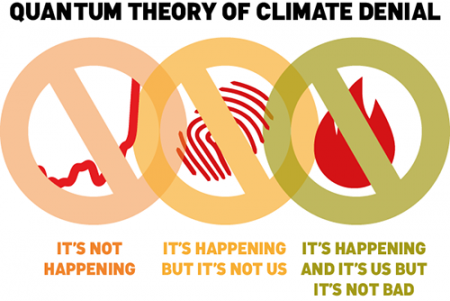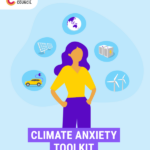September 30, 2017 – We are already seeing behavioural change as we humans come to grips with the science of climate change.
As an observing and reasoning species, the range of our reactions is highly variable. Many who look at climate change are utter skeptics. Some question any evidence that contradicts their beliefs. Some are unsettled by academic authority and see climate change as a conspiracy by elitists. Some, in acknowledging climate change, see a potential loss of their livelihood and lifestyle. This mindset is called identity-protective cognition and is all about self-preservation. System justifiers are all about keeping the status quo and any action to change this is seen as inappropriate. And then there are some traumatized by the notion making it easier to be in denial rather than face the evidence they often can see around them. And finally, you have those who defer to deniers seen as authority figures. This is called social dominance orientation. In a hierarchical society such as ours, when a leader calls climate change a Chinese hoax, if you succumb to social dominance orientation, you are compelled to believe him.
There is no doubt today that climate change has been politicized by figures like Trump. As a result, we are distracted from the science and the mounting evidence. We divide into camps. If conservative, despite the implied “conservation” in our name, we generally associate with deniers and skeptics. And if liberal, we line up with environmentalists and advocates for active climate intervention.
What has caused climate change?
A subset of humanity is the answer. The correlations we see in different data sets, rising carbon dioxide, methane, nitrous oxides, and other greenhouse gases in the atmosphere, and the mean global temperature rise almost in lockstep provides us with the evidence of what our lifestyle choices are doing to the planet. That’s not the lifestyle of the vast majority of us, but rather, that of a minority, largely located in the Western Hemisphere, or in locales with descendants of European origin. For those not identified within this lifestyle and geography, we see climate change victims, both present, and future.
Can climate change alter human behaviour?
Whether we accept that Hurricanes Harvey, Irma, and Maria are associated with climate change, or just three coincident extreme weather events happening within a 30-day window, it is our larger actions after that will give us an indication of our willingness to change.
Harvey’s disruptive impact in Texas, where flooding of a major American city has revealed poor decision making and lifestyle choices, should elicit policies and actions that mitigate against a future similar catastrophe. Will Houston and Texas institute better urban planning that acknowledges the increasing frequency and intensity of extreme weather events? Or will the city and state revert to the status quo?
For the Caribbean islands decimated by Irma and Maria, will the governments and citizens rebuild as before, or will they harden the infrastructure to withstand multiple 500-year storm events happening in less than 500-year increments? And will Florida re-examine its gung-ho shoreline development practices that continue to expose more of its citizens to climate risk?
What are the changes climate will bring this century?
Last year Scientific American, working with NASA Ames Research Center, compiled data for nearly every part of the planet and then applied a range of climate models to determine what our world will be like in 2100. From Alaska to Tuvalu, from Lagos to Cape Town, and from the Middle East to Melbourne, they created a picture of the conditions in these locales as the century turns.
It is not a pretty picture. Here are just a few projections:
- Alaska’s native villages will face rising sea levels, coastal erosion, permafrost melt, and warmer temperatures that will destroy communities and their way of life, and decimate wildlife and biodiversity.
- Pacific Ocean islands like Tuvalu will see most of their land vanish, displacing thousands.
- South Florida will be inundated continuously by rising sea levels making lifestyle in this part of the world no longer retiring.
- The Western United States will experience increasing cycles of wet and dry, with the latter longer in duration and leading to increasing wildfires.
- The Amazon Basin will experience changes in water flow and biodiversity, as well as increasing drought cycles.
- Lagos will be the paradigm for Developing World cities as it tries to cope with rural to urban migration as people flee farms no longer able to support crops.
- Southern Africa will experience increased drought episodes impacting the country’s ability to feed its growing population.
- Temperatures across the Middle East will make much of this region uninhabitable for humans.
- As Australia dries up and heats up so too will its coastal cities like Melbourne, leading to large-scale desalinization projects and other lifestyle adjustments.
- The South Asian monsoon will become more variable and more extreme, impacting the world’s most populous nations.
Identity-protective cognition will not save us from these and similar outcomes. Clinging to the status quo, and continuing to live our Western lifestyle, will not stop what we more than suspect will unfold. Are we prepared to commit to the behaviour change that climate change necessitates?









